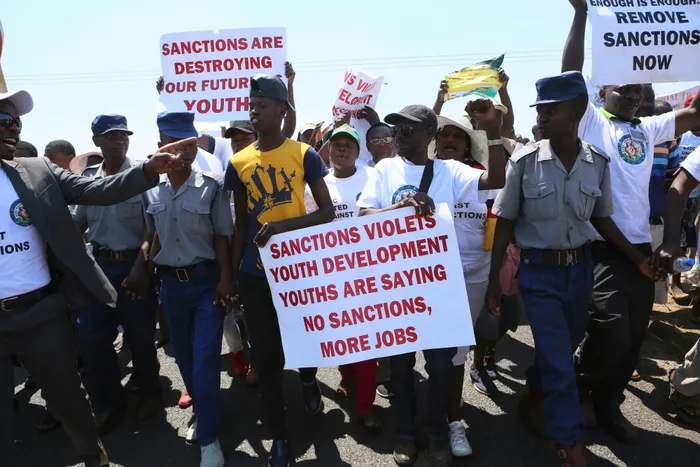
Police escort some hundreds of people marching on the streets of Harare in protest over US sanctions that the Zimbabwean government blames for the country's worsening economic problems in this undated file photo.
Image: File/Tsvangirayi Mukwazhi/AP
“Stay at home or risk being caught in the crossfire.” The chilling warning came not from a foreign invader, but from Blessed “Bombshell” Runesu Geza — a war veteran-turned-activist — as he addressed the nation in April.
His message was clear: Civilians might become collateral damage if armed confrontation erupts between state forces and “progressive” actors backing his cause. This is no longer a protest — it’s a declaration of potential civil conflict.
Are we witnessing the birth of an insurgency in Zimbabwe? It began with the March 31 stay-away protest. For a day, Zimbabwe’s bustling streets fell silent. Shops closed, offices emptied, and public transport was idle. It felt like a country pausing to exhale after years of political suffocation. That rare moment of mass coordination suggested there was still power in peaceful protest.
But success is a dangerous intoxicant. Galvanised by that initial impact, Geza called for an indefinite national shutdown beginning April 22. He demanded President Emmerson Mnangagwa’s resignation. But the second act flopped. The streets buzzed back to life as people resumed work. Zimbabweans, crippled by inflation and survivalist economics, could not afford the luxury of political theatre.
Faced with rejection, Geza didn’t retreat. He escalated. Clad in military fatigues, he warned that the country was heading toward armed conflict. Citizens were urged to stay indoors — not to make a political statement, but to avoid gunfire. It was a menacing shift. What began as a protest had mutated into a threat. He spoke of “collateral damage” with the casual tone of a man who’d accepted the inevitability of bloodshed.
Geza’s rhetoric found an echo in the voice of journalist and activist Hopewell Chin’ono. He called for “another liberation struggle”, branding elections useless and advocating “a total, all-out war against the current elite consensus”. He even floated the idea of a government in exile — an act with historical roots in revolutionary uprisings and, often, violent transitions of power.
Together, these two voices represent a dangerous duet — one militarising the struggle, the other intellectualising it. Their combined message is unmistakable: peaceful change is futile, and the time for war has arrived.
But the war against whom? Zimbabwe is no longer under foreign occupation or colonial rule. This is not the 1970s. To declare armed struggle against a sitting post-independence government is not liberation — it is fratricide.
Under international law, the shift from political dissent to armed threat is not protected — it is condemned. There is no legal or moral sanctuary for inciting violence that may endanger civilian life. No grievance, no matter how legitimate, excuses the intentional threat of bloodshed for political gain.
Liberation wars were once recognized in law as necessary revolts against apartheid, colonialism, and foreign domination. Zimbabwe’s own war for independence falls into that historical bracket. But today’s Zimbabwe is sovereign, post-colonial, and domestically governed. Any armed action taken against it from within is not resistance — it is rebellion, and in many jurisdictions, it is terrorism.
Those encouraging or orchestrating such acts could face criminal liability — both nationally and internationally. Zimbabwean law treats attempts to overthrow a constitutional order as treason. International frameworks treat politically motivated violence against civilians as terrorism. Leaders espousing these threats may soon find themselves facing arrest warrants, travel bans, or worse.
Some will argue this is desperation. That years of rigged elections, repression, and economic collapse leave no other path. But that argument is a seductive lie. Armed struggle is not an escape — it is a trap.
Zimbabwe has already suffered. Gukurahundi. 2008. The scars are deep. But what is being proposed now would not scar — it would shatter. Armed conflict is not precise. It does not limit itself to the corrupt or the powerful. It devours cities, families, and futures. The very people being rallied into revolution would be its first victims.
Moreover, violence gives authoritarian regimes exactly what they need: justification. Armed uprisings invite military crackdowns. Civil liberties vanish. Human rights are suspended. International actors step back. The very dream of freedom collapses under the rubble of reaction.
Zimbabwe must take the more difficult road — the one paved with ballots, legal battles, and civic engagement. It is a slow road. It is often thankless. But it is the only road that leads to peace, dignity, and lasting reform.
Instead of calling elections useless, fight to make them fair. Rally behind electoral reform, register voters, flood the polls, and overwhelm the rigging machine. Use the courts, however flawed, to challenge overreach. Strengthen civil society. Document abuses. Mobilize internationally. Make repression expensive. Make democracy irresistible.
Those who truly love Zimbabwe must understand: that real courage is not in picking up arms. It is in refusing to. Real strength lies in organising, not terrorising. And real legacy is built through nation-building — not nation-breaking.
Insurgency is not revolution. It is regression. Let history remember that in this moment of provocation, Zimbabweans chose peace. When faced with the lure of violence, they resisted. When calls for war echoed across digital platforms, cooler heads prevailed.
Zimbabwe does not need a second war of liberation. It needs a second birth of hope. Let’s put the guns away!